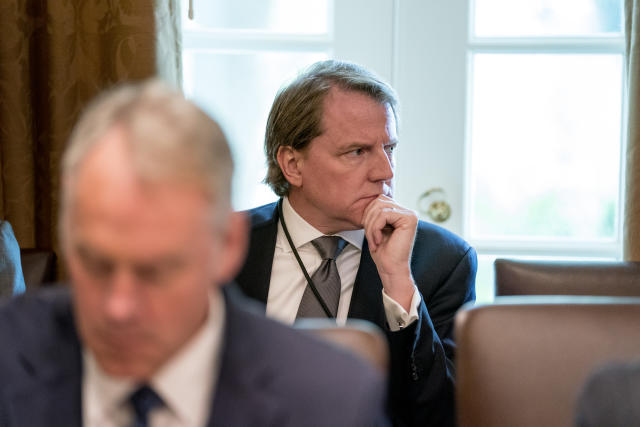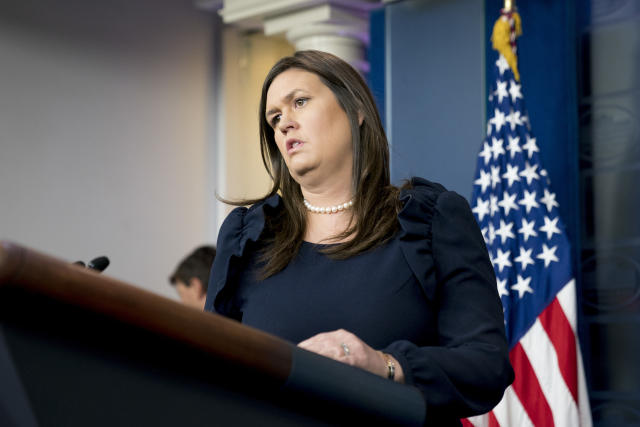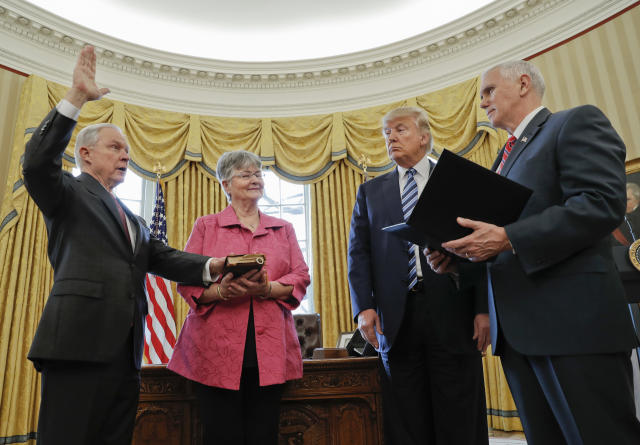Since before he was elected president, Donald Trump has operated in the belief that he can control his narrative through sheer force of will — and words. Day after day, he floods the airwaves with messages — ad-libbed speeches, off the cuff remarks and incendiary tweets — whose effect is to keep the world’s attention squarely on him.
As he explained at a July rally in Granite City, Ill., the advantage of never relinquishing the spotlight is “it’s covered live, much of it, and when I say it they can’t do anything about it.”
But this week, Trump’s relentless stream of words seems to have come back to haunt him, and may yet make the president want to reconsider his “it’s all about me” communications strategy. Trump’s problems largely grew out of things that he himself is alleged to have said.
It began on Sunday, when he issued a flurry of tweets blasting the New York Times for its report that White House counsel Don McGahn has been cooperating extensively with special counsel Robert Mueller’s Russia investigation.
McGahn has so far sat for 30 hours of questioning from Mueller’s team, detailing Trump’s private statements about the firing of FBI Director James Comey and the president’s anger at Attorney General Jeff Sessions for recusing himself in the Russia investigation. Unlike Trump’s personal lawyer Rudy Giuliani (more on him in a moment), McGahn represents the office of the presidency, and, according to the Times, felt compelled to testify to Mueller out of fears that the president was setting him up to take the fall on possible obstruction charges.

The Times story clearly irritated the president, who claimed he had “nothing to hide.”
It isn’t known what McGahn told investigators. But it’s safe to assume he shared what he knew about Trump’s outbursts against Comey, Sessions, disgraced former national security adviser Michael Flynn, Deputy Attorney General Rod Rosenstein and others.
On NBC’s “Meet the Press,” host Chuck Todd asked Giuliani why the president didn’t simply meet with Mueller and tell the truth about what had transpired, which led the former New York mayor into the realm of postmodern philosophy, raising the novel defense that “Truth isn’t truth!” That Orwellian turn of phrase brought to mind what Trump himself declared in a July speech to the Veterans of Foreign Wars: “What you’re seeing and what you’re reading is not what’s happening.”
Trump also stepped up his attacks on Mueller, likening the special counsel’s investigation to “McCarthyism at its worst!” In addition to the McGahn revelations, the backdrop to the increased volume of the president’s tweets was the imminent conclusion of the trial of his former campaign manager Paul Manafort. The White House braced for the possibility that Mueller’s team might secure its fifth conviction, not a bad tally for what Trump has frequently labeled a “WITCH HUNT!”
As a Monday interview with Reuters showed, the president was worried about how the prosecution could use his own words against him.
“So if I say something and [Comey] says something, and it’s my word against his, and he’s best friends with Mueller, so Mueller might say: ‘Well, I believe Comey,’ and even if I’m telling the truth, that makes me a liar,” Trump said. “That’s no good.”
Oddly, though, Trump also assured the country that, if he wanted to, he could simply pull the plug on an investigation into his own campaign’s ties with the Russian government.
“I can go in, and I could do whatever — I could run it if I want,” Trump said. “But I decided to stay out.”

On Tuesday, Trump’s longtime personal lawyer Michael Cohen pleaded guilty to eight felonies, telling a federal judge that Trump had personally directed him to pay off two women to keep quiet about alleged extramarital affairs “for the principal purpose of influencing the election.”
Cohen’s stunning admission contradicted all the dissembling stories Trump, Giuliani and White House press secretary Sarah Sanders had told about the payments.
But Team Trump’s bad day was far from over. A jury in Alexandria, Va., found Manafort guilty of eight felony counts that included tax fraud, bank fraud and hiding foreign bank accounts. But for a single holdout, the jury would have returned guilty verdicts on all 18 of the charges in the indictment. Mueller may yet decide to retry the remaining 10 with a new jury. Meanwhile, Manafort’s trial on separate charges of money laundering and failing to register as a foreign agent is coming up next month in Washington, D.C.
The president ended the day in West Virginia, at a rally for Democratic Sen. Joe Manchin’s opponent, Patrick Morrisey. But when his crowd launched into the obligatory chant of “Lock her up!” at the mention of Hillary Clinton’s name, Trump seemed more distracted than usual. Often at his safe space gatherings, the president will relish the portion of his speech that he reserves for going after Sessions, Comey and Mueller by name and deed, but after the Cohen and Manafort bad news, he limited it to a passing afterthought: “Where is the collusion? You know they’re still looking for collusion,” Trump said. “Where is the collusion? Find some collusion. We want to find the collusion!”
On cable news, Cohen’s lawyer Lanny Davis was busy answering Trump’s question. “Mr. Cohen has knowledge of certain subjects that should be of interest to the special counsel, and is more than happy to tell the special counsel all he knows,” Davis told MSNBC’s Rachel Maddow. “Not just about the obvious possibility of a conspiracy to collude and corrupt the American democracy system in the 2016 election, which the Trump Tower meeting was all about, but also knowledge about the computer crime of hacking and whether or not Mr. Trump knew ahead of time about that crime and even cheered it on.”

On Wednesday, it was left to Sanders to try to explain exactly how what was being reported was not what was actually happening.
“As the president has said and we’ve stated many times, he did nothing wrong. There are no charges against him, and we’ve commented on it extensively,” she told reporters gathered in the briefing room. “Just because Michael Cohen made a plea deal, that doesn’t implicate the president on anything.”
The president went ever further on Twitter, saying that the acts Cohen admitted to weren’t actual crimes.
How one pleads guilty to noncriminal acts is something legal scholars may parse for generations to come. To make it so, however, one needs only to return to Giuliani’s “truth isn’t truth” logical framework.
But as Thursday dawned, the administration’s defense that it was Cohen’s word against Trump’s was unraveling.
David Pecker, an executive at American Media, the parent company of the National Enquirer, reached an immunity deal with federal prosecutors to provide them with the details of Trump’s hush-money payments to actress Stormy Daniels and Playboy model Karen McDougal. That money was paid to the women in exchange for the rights to publish their stories, which the tabloid summarily buried.
In a “Fox & Friends” interview, Trump continued to fume over Cohen’s betrayal, with the president suggesting his former’s lawyer’s cooperation with prosecutors should be “outlawed.”
“It’s called flipping, and it almost ought to be illegal,” Trump said.
The president also castigated Sessions, who recused himself from Mueller’s Russia probe shortly after he was appointed attorney general.

“I put in an attorney general that never took control of the Justice Department,” Trump said. “Jeff Sessions never took control of the Justice Department, and it’s a sort of an incredible thing.”
“Jeff Sessions recused himself, which he shouldn’t have done. Or he should have told me,” Trump continued. “Even my enemies say that Jeff Sessions should have told you that he was going to recuse himself, and then you wouldn’t have put him in. He took the job and then he said, ‘I’m going to recuse myself.’ I said, ‘What kind of a man is this?’”
Sessions, who rarely responds to Trump’s public criticism, fired back.
“I took control of the Department of Justice the day I was sworn in,” he said, adding: “While I am Attorney General, the actions of the Department of Justice will not be improperly influenced by political considerations.”
Trump responded in a series of tweets urging the nation’s top law enforcement official to investigate a long list of his perceived enemies.
But the news, as it seemed to do all week for Trump, went from bad to worse. Late Friday morning, the Wall Street Journal reported that prosecutors in the U.S. attorney’s office in Manhattan granted immunity to Allen Weisselberg, the longtime chief financial officer of the Trump Organization. While Trump’s latest defense is that those who flip to spare themselves from being prosecuted for the crimes they are accused of makes them a “rat,” it’s patently clear that even rats know when to jump a sinking ship.















